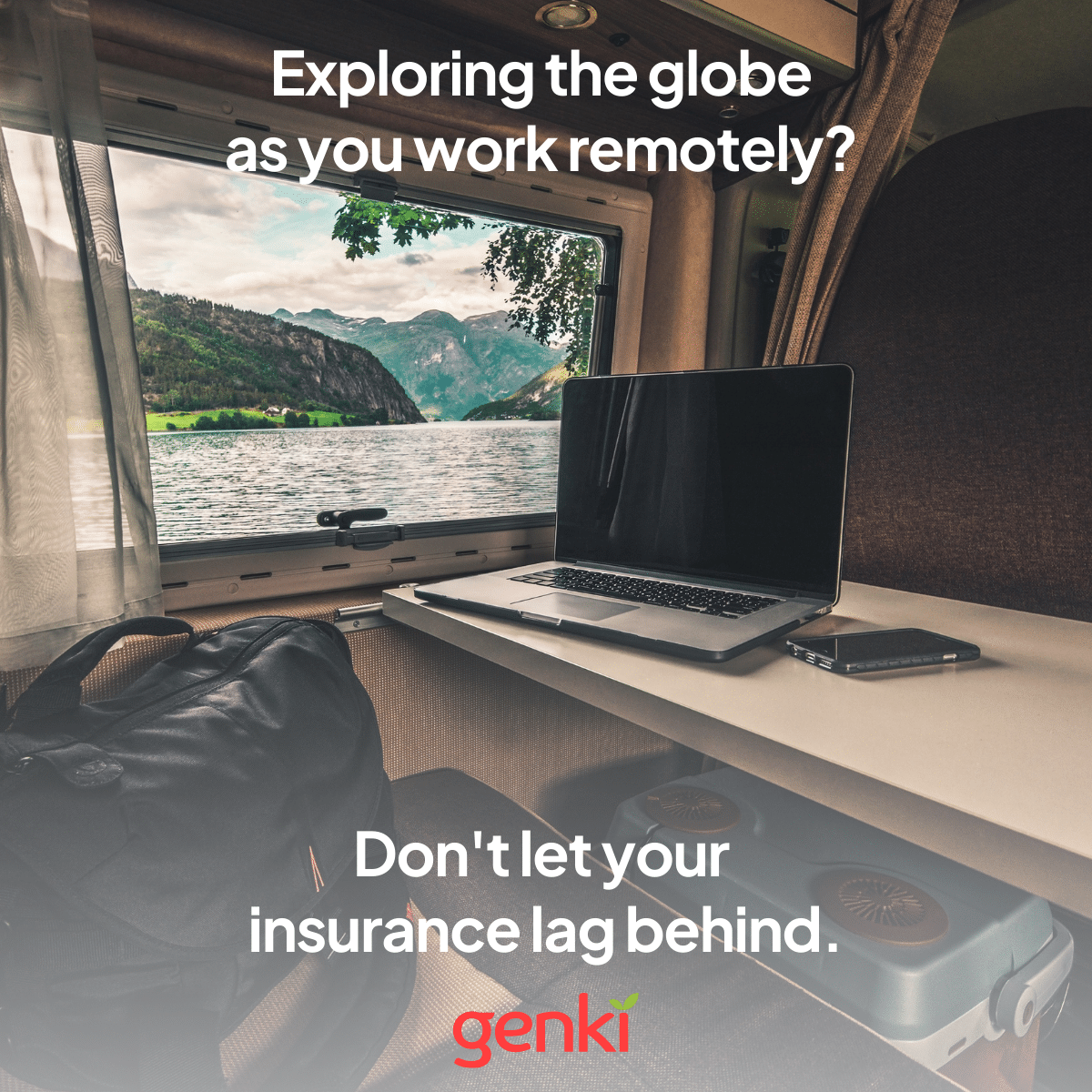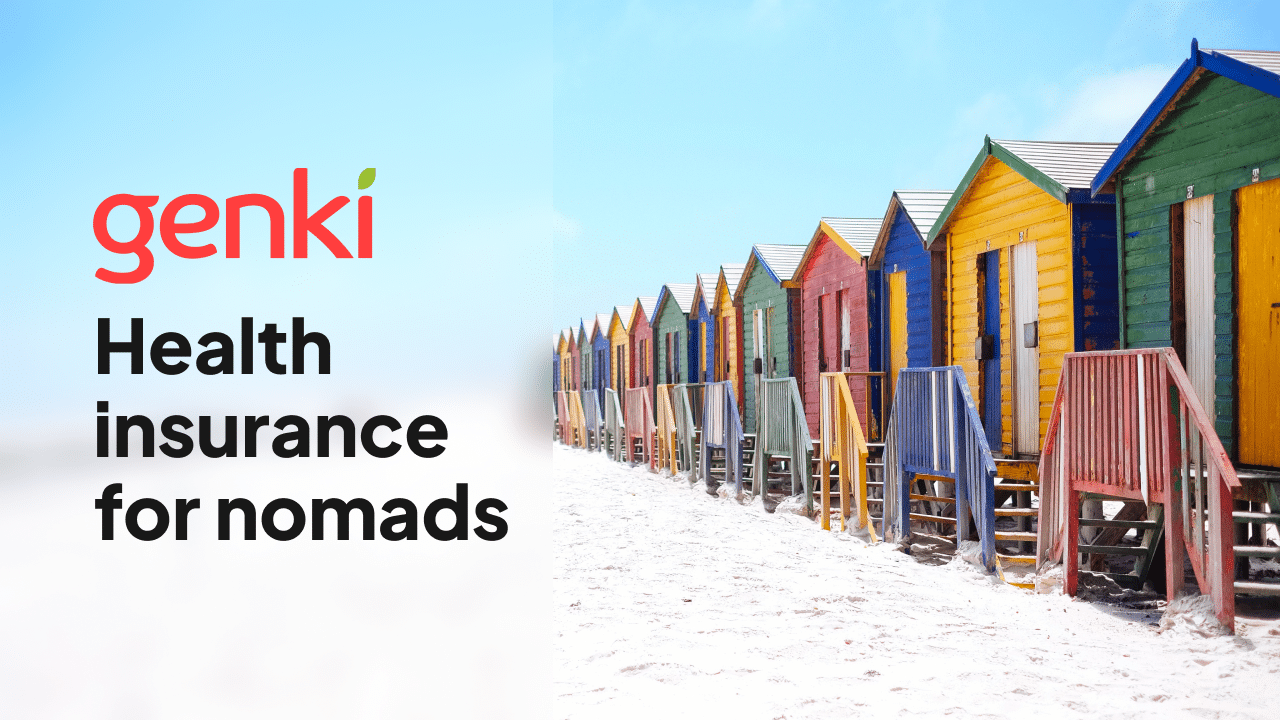Travel insurance is a must-have for all types of travelers, from vacationers to digital nomads and backpackers. That’s why in this Genki travel insurance review, we’ll go over the ins and outs of Genki health insurance for digital nomads and see if it’s worth it. We’ll also cover the differences between Genki Explorer versus Resident: Genki’s two main products.
The unpredictability of travel, with its inherent risks such as medical emergencies, trip cancellations, and lost baggage, underscores the necessity of this protection.
Medical costs abroad can be substantial, especially in countries with high healthcare expenses, such as the United States. In stark contrast, travel insurance can significantly alleviate these costs.
Some policies even cover the cost of repatriation following a severe medical emergency, which can cost tens of thousands of dollars.
Travel insurance offers varied coverage, including medical, trip cancellation, lost or delayed baggage, and more. It’s crucial to consider your specific travel needs when selecting a policy.
For instance, digital nomads or backpackers might require a plan that covers long-term travel and offers flexibility, while vacationers may prioritize trip cancellation and interruption coverage.
Travel insurance isn’t a luxury — it’s a necessity. Now, let’s get into the Genki health insurance review.
Related:
Genki Travel Insurance Overview

Genki Travel Insurance, a health-centric ecosystem provider founded in 2021, was explicitly designed for world residents, such as digital nomads and people traveling across multiple countries. The company has carved out a niche in the industry by focusing on the unique needs of frequent and long-term travelers.
The Genki Explorer plan, for example, is a travel health insurance solution tailored for digital nomads and remote workers. It covers emergencies and most medically necessary treatments, including uncomplicated infections and back pain. This focus on comprehensive health coverage sets Genki apart from other insurance providers, which may only cover trip interruptions or cancellations.
Genki’s innovative approach to travel insurance has garnered positive reviews from users. Its flexible monthly subscription model, which allows customers to sign up anytime from anywhere, has been particularly appreciated by its target audience of regular travelers, digital nomads, and backpackers.
Key Features
Genki Travel Insurance stands out with its comprehensive coverage and maximum flexibility, making it an ideal choice for frequent travelers, digital nomads, and backpackers. Key features of this insurance include:
- Flexibility: Genki offers a monthly insurance subscription that lasts from one month to two years. This allows travelers to adjust their coverage based on their travel plans.
- Comprehensive Coverage: With Genki, you get complete coverage of hospital visits, sports injuries, accidents, and more. There is almost no cost limit, ensuring you’re covered for most medical emergencies abroad.
- Home Country Coverage: Genki covers up to 180 days per year in your home country. This is especially useful for digital nomads who spend part of the year in their home country.
- Preventive Care and Telemedicine: The Genki Resident basic plan includes preventive care and telemedicine. These services can be crucial for maintaining health during long-term travel.
- Extra Benefits: Genki’s insurance also covers extra benefits like emergency dental and mental health services, providing a holistic approach to health coverage.
- Emergency Evacuation and Repatriation: In case of severe illness or injury, Genki covers the cost of emergency evacuation and repatriation to your home country.
Genki Travel Insurance Review

Genki Explorer vs Resident
Genki offers two main travel insurance plans: Explorer and Resident (plus an additional plan called Genki Premium). But what are the differences between these plans? Let’s take a look.
The first thing to note is that all Genki health insurance plans cover medical emergencies and accidents. This means that no matter which plan you choose, you can rest assured that you’ll be covered if something unexpected happens while you’re on the road.
Genki Explorer is for you if you plan on traveling between 1 month and 2 years. This plan covers any citizen from any country from 0 to 49 years old.
Genki Resident and Genki Resident Premium, however, are for you if you plan on traveling for at least 1 year or longer. These plans cover any citizen from any country and any age.
One key difference between these plans is their coverage in your home country. Genki Explorer covers you for up to 42 days in your home country within any 180 days. This means that if you’re a digital nomad who likes to return home regularly, this plan might not fit you best. Genki Resident, however, covers you in your home country for up to 180 days per year.
Another difference between these plans is their coverage of extreme sports. Genki Explorer doesn’t cover extreme sports, including bungee jumping, mountain climbing, parachuting, racing, scuba diving, and sky diving. If you’re planning on engaging in any of these activities, you’ll want to opt for Genki Resident, which covers all sports. One thing to note is none of the plans cover professional sports.
Lastly, there’s a difference in the coverage of preventive care. Genki Explorer doesn’t cover preventive care at all. On the other hand, Genki Resident covers medical examinations, dental care, vision examinations, pregnancy care, and more. For maximum coverage, you’ll want to choose the Genki Resident Premium plan, which also includes dental cleanings and prescription glasses.
Choosing between Genki Explorer and Genki Resident comes down to your specific needs as a traveler. Most travelers will be fine choosing Genki Explorer versus the Genki Resident plans.
What’s Not Covered in the Genki Explorer Plan?
The Genki Explorer Plan is an insurance policy designed with the traveler in mind. However, like any insurance plan, it comes with certain limitations and exclusions to ensure its financial viability and to meet regulatory requirements. Since, the Explorer Plan has less insurance coverage than the Premium Plan, but still a great budget-frienly option for backpackers and digita nomads, we’ll go over what’s not covered in the Explorer Plan.
Here are the main details:
Pre-Existing Conditions: The plan doesn’t cover pre-existing conditions or any medical condition diagnosed within six months before the start of the insurance. This is standard across most insurance policies because these are considered known risks, and insurance is designed to cover unforeseen events.
High-Risk Activities: The insurance doesn’t cover dangerous activities such as diving, motorcycle racing, parachuting, etc. The inherent risk involved in these activities makes them uninsurable under a standard travel insurance policy.
Professional Sports: Injuries or illnesses resulting from professional sports, where there’s compensation for participation, are not covered. This is due to the higher likelihood of injury in professional sports compared to recreational sports.
Substance Misuse: The plan doesn’t cover the consequences of drug use or excessive alcohol consumption. Insurance companies often exclude this because of the voluntary nature and high risk associated with substance misuse.
War Participation: While passive activities like journalism in war zones are covered, active participation in war activities isn’t. The unpredictability and high risk of war activities make them uninsurable under most travel insurance plans.
Medical Tourism: If the primary purpose of your journey is to seek medical treatment, it won’t be covered. This is because insurance is meant to cover unexpected health emergencies, not planned medical procedures.
Non-Medical Travel-Related Costs: Because the Genki Explorer Plan is primarily a health insurance policy, it doesn’t cover non-medical travel-related costs such as trip cancellation, flight delays, lost luggage, etc.
Post-Medical Return Transport: The insurance may terminate after a medical return transport to your home country. This is because once you’re back in your home country, your domestic health coverage is expected to kick in.
There are also certain restrictions:
Deductible: To reduce your premiums, you can choose a deductible option. You’ll pay the first €50 of each claim, and the insurance will cover the rest. There’s an additional €250 deductible for treatments in U.S. emergency rooms unless it’s medically necessary.
Home Country Coverage: The coverage in your home country is limited to 6 weeks per 180 days and only covers accidents and life-threatening emergencies. The plan is designed primarily for travel outside your home country.
Waiting Period: If you sign up for the plan while abroad, there’s a 14-day waiting period during which coverage is restricted to accidents and emergencies. This prevents people from buying insurance when they’re already sick or injured.
Pre-Existing Pregnancy: Coverage for pre-existing pregnancy is limited to acute and unforeseeable health deterioration of the mother or child. This is because routine maternity care is predictable and typically excluded from travel insurance.
Genki Alternatives
Here is a list of the best alternatives to Genki health insurance. These plans are comparable and are easy to sign up online, making them excellent for long-term travelers, backpackers, and digital nomads.
1. SafetyWing
SafetyWing bills itself as “Insurance for Nomads, by Nomads.” It offers a flexible monthly subscription model and can be purchased while already abroad.
Coverage includes medical emergencies, trip interruption, lost checked luggage, and even one child, up to 10 years old, per adult under the policy at no extra cost.
For every 90 days of coverage, while traveling abroad, you are covered for up to 30 days in your home country.
2. World Nomads
World Nomads is a popular choice among backpackers and digital nomads. It offers two main types of travel insurance, the Standard Plan and the Explorer Plan, with varying levels of coverage.
Coverage includes medical expenses, emergency evacuation, trip cancellation, and gear protection. However, pre-existing medical conditions and certain adventure sports are excluded from the Standard Plan.
3. Insured Nomads
Insured Nomads offers comprehensive global health and travel insurance. They offer a range of plans with different levels of coverage to cater to different needs, including maximum benefits of up to $2 million and no deductible.
4. PassportCard
PassportCard offers international travel insurance with real-time processing, meaning you don’t have to pay out-of-pocket expenses during an emergency.
Their coverage includes medical expenses, trip cancellation, and personal belongings.
5. Heymondo
Heymondo offers comprehensive travel insurance packages focusing on simplicity and customer service. They provide a free mobile app that allows customers to manage their policies and claims directly from their smartphones.
Final Thoughts
Wrapping up this Genki health insurance review, I’ll discuss who it’s for.
Personally, I believe the Genki Explorer Plan is excellent for vacationers going on a one-month trip, backpackers traveling the world, and digital nomads. The price point is competitive and can be cheaper than the competitors, depending on your needs.
On the other hand, the Genki Resident Plan price starts at more than double the Standard Plan but offers more value in your home country, plus preventative care. The Resident Plan is best for travelers who don’t have medical insurance in their home country.
Frequently Asked Questions
Is Genki a good travel insurance?
Genki is often seen as a good option for travel health insurance, particularly for digital nomads and budget-conscious travelers.
According to a Reddit discussion, Genki’s prices are considered mid-range for travel health insurance, but the quality of coverage they offer is very high. Several customer service reviews on Trustpilot also rate Genki as excellent, with a 4.3 out of 5.
While Genki may not offer coverage for non-health-related issues, it is generally well-reviewed for its health coverage, customer service, and affordability.
What is Genki World?
Genki World, better known as genki.world, is the URL domain of travel insurance company Genki, headquartered in Cologne, Germany. It appears Genki had to settle on the .world TLD (top-level domain) because the .com TLD is registered to a domain reseller. Genki sells travel insurance mainly to digital nomads or remote workers, but it’s also excellent for long-term travelers like backpackers.

![Genki Travel Insurance Review: Is It Worth It? [November 2023]](https://aperlust.com/wp-content/uploads/2023/11/genki-travel-insurance-review.png)